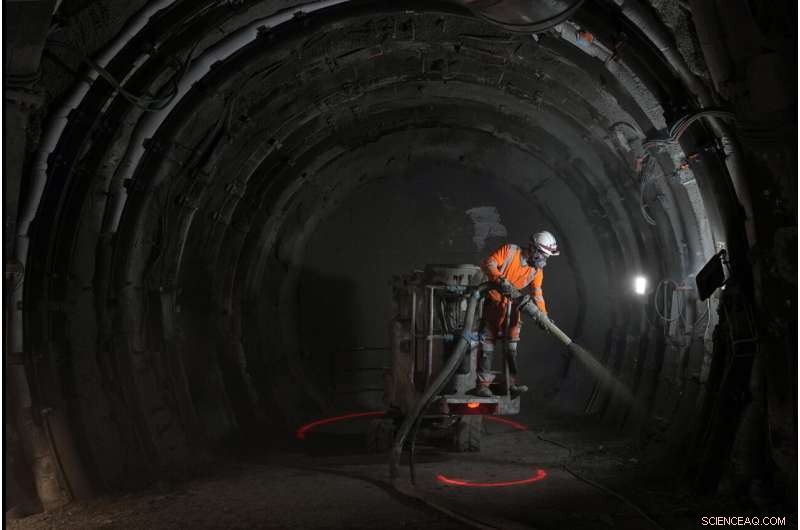
Un lavoratore spruzza uno strato di protezione in cemento in un tunnel per i rifiuti radioattivi in un laboratorio sotterraneo gestito da Andra, un'agenzia che gestisce i rifiuti, a Bure, nella Francia orientale, giovedì 28 ottobre 2021. L'energia nucleare è un punto critico centrale mentre i negoziatori pianificano la futura strategia energetica mondiale ai colloqui sul clima a Glasgow, in Scozia. Credito:AP Photo/Francois Mori
Nel profondo di una foresta francese di querce, betulle e pini, un flusso costante di camion porta un silenzioso promemoria del costo spesso invisibile dell'energia nucleare:contenitori di scorie radioattive, destinati a essere immagazzinati per i prossimi 300 anni.
Mentre i negoziatori pianificano come alimentare il mondo riducendo allo stesso tempo le emissioni di carbonio durante i colloqui sul clima in Scozia, l'energia nucleare è un punto critico. I critici ne denunciano il prezzo mastodontico, i danni sproporzionati causati dagli incidenti nucleari e gli avanzi radioattivi che rimangono mortali per migliaia di anni.
Ma sostenitori sempre più accesi e potenti, tra cui alcuni scienziati del clima ed esperti ambientali, sostengono che l'energia nucleare è la migliore speranza al mondo di tenere sotto controllo i cambiamenti climatici, osservando che emette così poche emissioni dannose per il pianeta ed è in media più sicura di quasi tutti altra fonte di energia. Gli incidenti nucleari sono spaventosi ma estremamente rari, mentre l'inquinamento da carbone e altri combustibili fossili provoca morte e malattie ogni giorno, affermano gli scienziati.
"La portata di ciò che la civiltà umana sta cercando di fare nei prossimi 30 anni (per combattere il cambiamento climatico) è sbalorditiva", ha affermato Matt Bowen, del Center for Global Energy Policy della Columbia University. "Sarà molto più scoraggiante se escludiamo nuove centrali nucleari, o ancora più scoraggiante se decidiamo di chiudere tutte insieme le centrali nucleari".
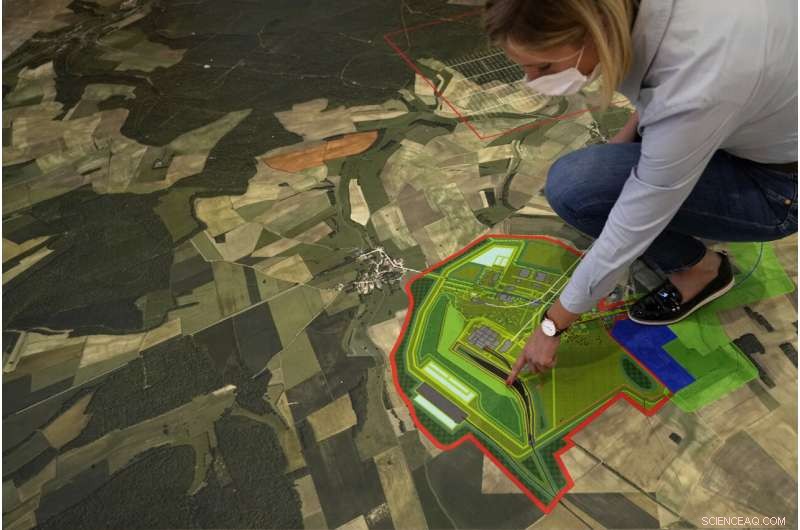
Audrey Guillemenet, geologa e portavoce, mostra una mappa di un laboratorio sotterraneo gestito dall'agenzia francese per la gestione dei rifiuti radioattivi Andra, a Bure, nella Francia orientale, giovedì 28 ottobre 2021. L'energia nucleare è un punto critico mentre i negoziatori pianificano le futura strategia energetica ai colloqui sul clima a Glasgow, in Scozia. Credito:AP Photo/Francois Mori
Molti governi stanno spingendo per consacrare l'energia nucleare nei piani climatici che verranno presentati alla conferenza di Glasgow, nota come COP26. L'Unione Europea, nel frattempo, sta discutendo se etichettare l'energia nucleare come ufficialmente "verde", una decisione che guiderà miliardi di euro di investimenti negli anni a venire. Ciò ha implicazioni in tutto il mondo, poiché la politica dell'UE potrebbe stabilire uno standard seguito da altre economie.
Ma che dire di tutti quegli sprechi? I reattori di tutto il mondo producono migliaia di tonnellate di detriti altamente radioattivi all'anno, oltre a ciò che è già stato lasciato da decenni di sfruttamento dell'atomo per elettrificare case e fabbriche in tutto il mondo.
La Germania è in testa alla classifica dei paesi, principalmente all'interno dell'UE, fermamente contraria all'etichettatura del nucleare come "verde". Nel frattempo, l'amministrazione Biden sostiene l'energia nucleare, la Cina ha una dozzina di reattori in costruzione e persino il Giappone sta promuovendo di nuovo l'energia nucleare, 10 anni dopo il disastro della sua centrale di Fukushima.
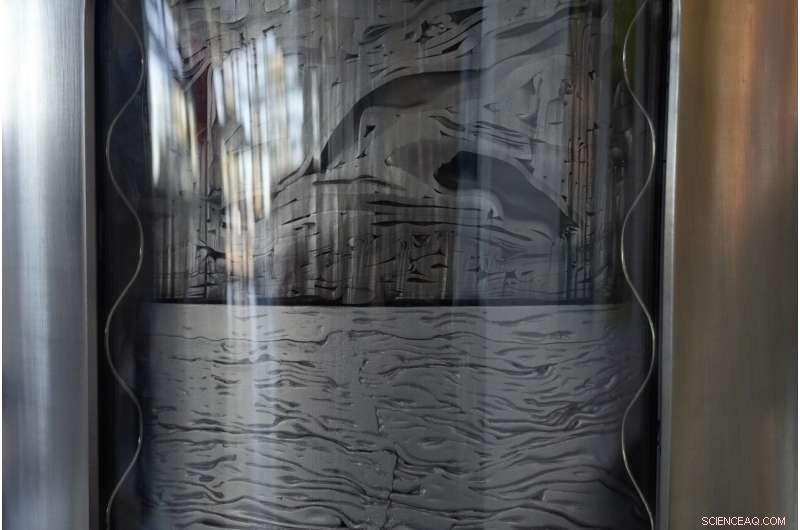
Una mostra di rifiuti radioattivi compressi si trova in uno showroom accanto a un laboratorio sotterraneo gestito dall'agenzia francese per la gestione dei rifiuti radioattivi Andra, a Bure, nella Francia orientale, giovedì 28 ottobre 2021. L'energia nucleare è un punto critico mentre i negoziatori pianificano il la futura strategia energetica mondiale ai colloqui sul clima a Glasgow, in Scozia. Credito:AP Photo/Francois Mori
Ma in nessun posto al mondo dipende dai reattori nucleari come la Francia, che è in prima linea nella spinta pro-nucleare a livello europeo e globale. Ed è tra i principali attori nel settore delle scorie nucleari, nel riciclaggio o nel ritrattamento di materiali provenienti da tutto il mondo.
A sud dei campi di battaglia di Verdun della prima guerra mondiale, camion con adesivi di avvertenza radioattività si fermano in un deposito di rifiuti vicino al villaggio di Soulaines-Dhuys. Vengono ripetutamente controllati, cancellati e scansionati per individuare eventuali perdite. Il loro carico, rifiuti compattati infilati in cilindri di cemento o acciaio, viene accatastato da gru robotiche in magazzini che vengono poi riempiti di ghiaia e sigillati con altro cemento.
L'agenzia che gestisce i rifiuti, Andra, sa che fa paura alle persone. "Non posso combattere le paure delle persone. Il nostro ruolo è garantire la sicurezza delle persone, dell'ambiente e dei lavoratori del sito", ha affermato il portavoce Thierry Pochot.
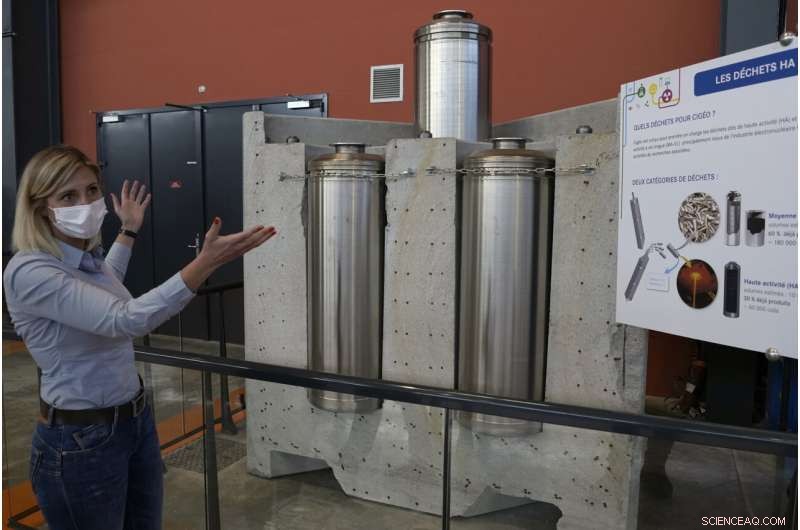
Audrey Guillemenet, geologa e portavoce, mostra un progetto per i rifiuti radioattivi gestito dall'agenzia francese per la gestione dei rifiuti radioattivi Andra, a Bure, nella Francia orientale, giovedì 28 ottobre 2021. L'energia nucleare è un punto critico mentre i negoziatori pianificano il futuro del mondo strategia energetica ai colloqui sul clima a Glasgow, in Scozia. Credito:AP Photo/Francois Mori
Le unità di stoccaggio detengono il 90% dei rifiuti radioattivi francesi di attività medio-bassa, inclusi strumenti, indumenti e altro materiale legato al funzionamento e alla manutenzione del reattore. Il sito è progettato per durare almeno 300 anni dopo l'arrivo dell'ultima spedizione, quando si prevede che la radioattività dei suoi contenuti non sarà superiore ai livelli presenti in natura.
Per i rifiuti a lunga durata, principalmente combustibile nucleare utilizzato, che rimane potenzialmente mortale per decine di migliaia di anni, la Francia sta gettando le basi per un deposito permanente nella terra profonda sotto i campi di grano e mais fuori dal vicino villaggio di Bure in pietra.
A circa 500 metri (iarde) sotto la superficie, i lavoratori effettuano prove sull'argilla e sul granito, scavano gallerie e cercano di dimostrare che il piano di stoccaggio a lungo termine è la soluzione più sicura per le generazioni future. Siti simili sono in fase di sviluppo o studio anche in altri paesi.
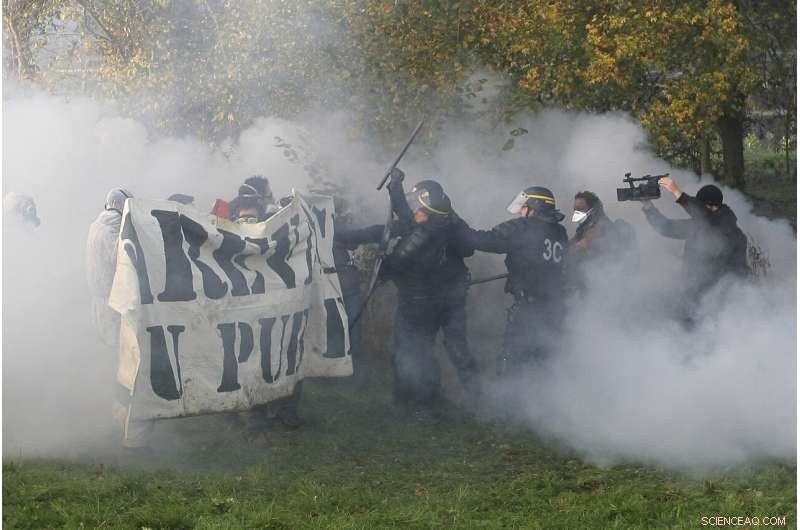
Un gruppo di attivisti si scontra con agenti di polizia antisommossa all'inizio di mercoledì 23 novembre 2011 a Lieusaint, in Normandia, Francia, mentre cercano di bloccare i binari del treno nel tentativo di fermare un treno carico di scorie nucleari diretto a Gorleben in Germania . L'energia nucleare è un punto critico centrale poiché i negoziatori pianificano la futura strategia energetica mondiale ai colloqui sul clima a Glasgow, in Scozia. I critici ne denunciano il prezzo mastodontico, i danni sproporzionati causati da incidenti nucleari e scorie radioattive. Ma un crescente campo pro-nucleare sostiene che è in media più sicuro di quasi qualsiasi altra fonte di energia. Credito:AP Photo/David Vincent, File
Se il deposito ottiene l'approvazione normativa francese, conterrebbe circa 85.000 tonnellate (94.000 tonnellate) delle scorie più radioattive prodotte "dall'inizio dell'era nucleare fino alla fine degli impianti nucleari esistenti", ha affermato Audrey Guillemenet, geologa e portavoce di il laboratorio sotterraneo.
"Non possiamo lasciare questi rifiuti nei siti di stoccaggio in superficie", dov'è ora, ha detto. "Questo è sicuro, ma non sostenibile."
The 25 billion euro ($29 billion) cost of the proposed repository is already built into budgeting by French utilities, Guillemenet said. But that's just one piece of the staggering cost of building and operating nuclear plants, and one of the reasons that opposition abounds.
All around Bure, street signs are replaced with graffiti reading "Nuclear is Over," and activists camp out at the town's main intersection.
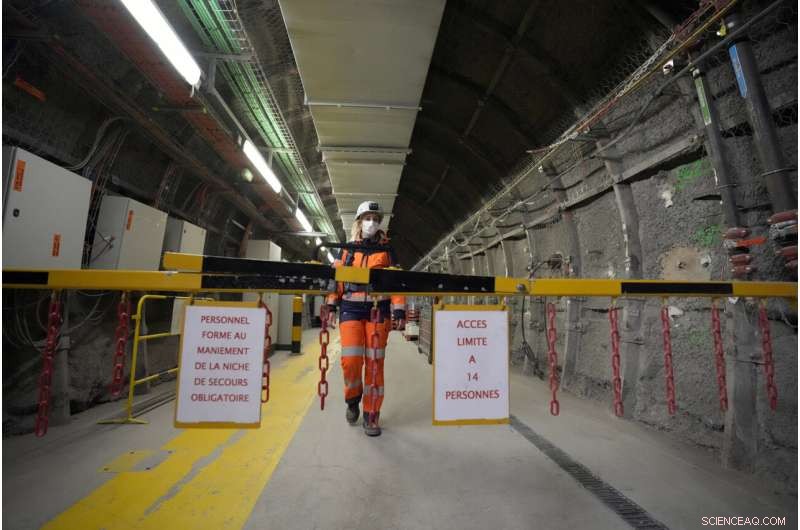
Audrey Guillemenet, geologist and spokesperson, walks in a tunnel for radioactive waste next to the emergency safety room in an underground laboratory run by French radioactive waste management agency Andra, in Bure, eastern France, Thursday, Oct. 28, 2021. Nuclear power is a central sticking point as negotiators plot out the world's future energy strategy at the climate talks in Glasgow, Scotland. Credit:AP Photo/Francois Mori
Greenpeace accuses the French nuclear industry of fobbing off waste on other countries and covering up problems at nuclear facilities, which industry officials deny. Activists staged a protest last week in the port of Dunkirk, as reprocessed uranium was being loaded onto a ship for St. Petersburg, demanding an end to nuclear energy and more research into solutions for existing waste.
"Nuclear waste ... needs to be dealt with," Bowen said. But "with fossil fuels, the waste is pumped into our atmosphere, which is threatening us from the risks of climate change and public health impacts from air pollution."
Some prominent scientists now embrace nuclear. They argue that over the past half-century, nuclear power stations have avoided the emission of an estimated 60 billion tons of carbon dioxide by providing energy that otherwise would have come from fossil fuels.
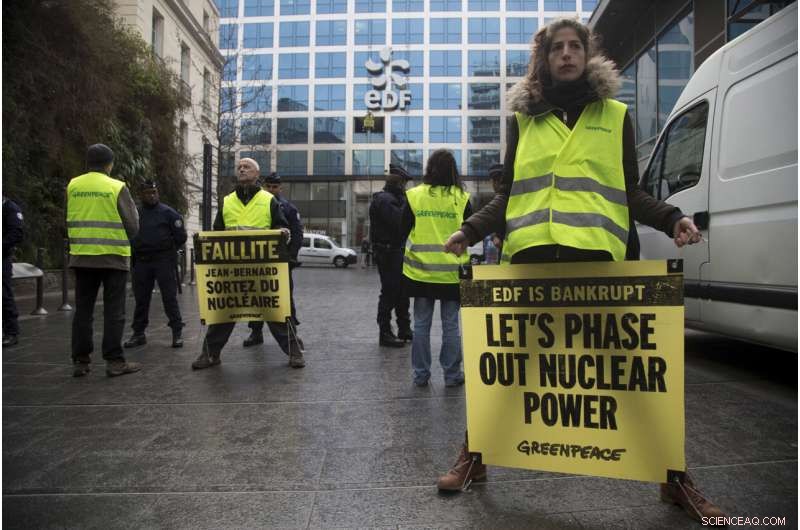
Greenpeace activists hold placards during the presentation of EDF group's 2016 results in Paris, Feb. 14, 2017. Greenpeace accuses the French nuclear industry of fobbing off waste on other countries and covering up problems at nuclear facilities, which industry officials deny. Credit:AP Photo/Thibault Camus, File
U.S. climate envoy John Kerry says he's changed his early career opposition to nuclear because of the greater necessity to cut emissions.
"People are beginning to understand the consequences of not going nuclear," said Kerry Emanuel, professor of atmospheric science at MIT. Amid a "growing awareness of the rise of climate risks around the world, people are beginning to say, 'that's a bit more frightening than nuclear power plants.'"
Some activists want to end nuclear energy today, and others want to phase it out soon. But Emanuel noted examples of countries or states that shut nuclear plants before renewables were ready to take up the slack—and had to return to coal or other planet-choking energy sources.
The current energy crunch is giving nuclear advocates another argument. With oil and gas costs driving an energy price crisis across Europe and beyond, French President Emmanuel Macron has trumpeted "European renewables and, of course, European nuclear."
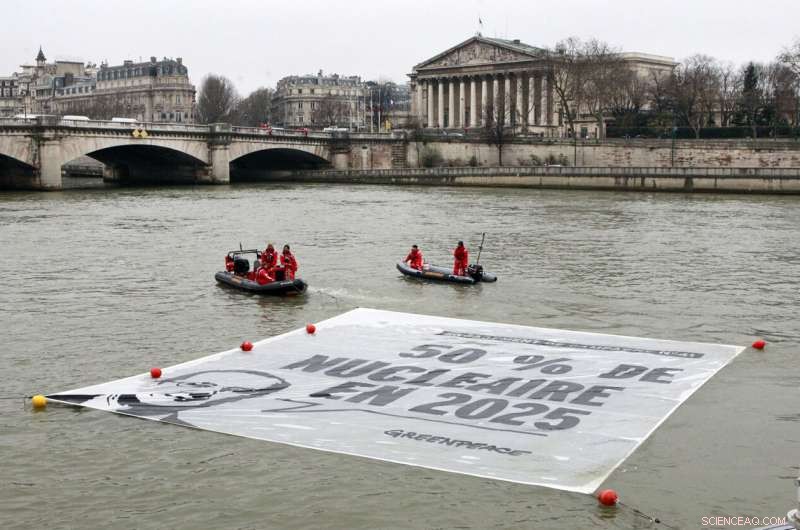
Greenpeace activists unfold a banner reading "50 percent of nuclear energy by 2025" on the Seine River in front of the National Assembly in Paris, Monday, March 9, 2015. Greenpeace accuses the French nuclear industry of fobbing off waste on other countries and covering up problems at nuclear facilities, which industry officials deny. Credit:AP Photo/Remy de la Mauviniere, File
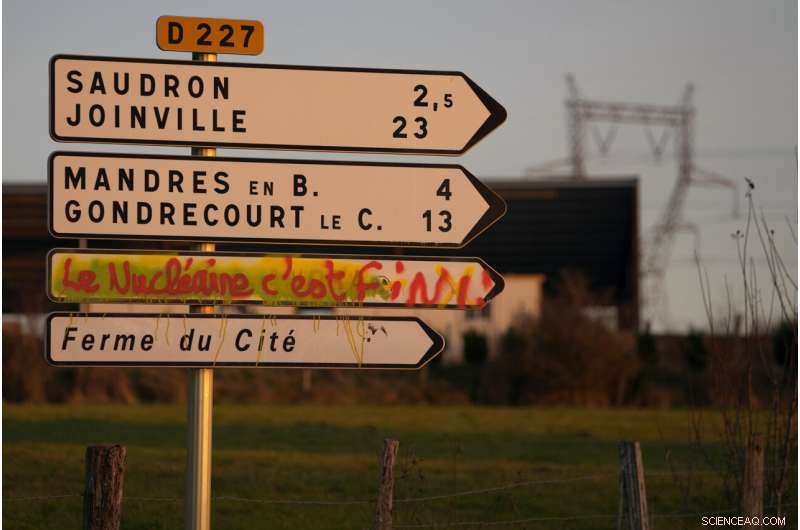
A road sign is painted with "Nuclear Is Over" next to an underground laboratory in Bure, eastern France, Thursday, Oct. 28, 2021. Nuclear power is a central sticking point as negotiators plot out the world's future energy strategy at the climate talks in Glasgow, Scotland. Credit:AP Photo/Francois Mori

Audrey Guillemenet, geologist and spokesperson, shows a tunnel project map for radioactive waste in an underground laboratory run by French radioactive waste management agency Andra, in Bure, eastern France, Thursday, Oct. 28, 2021. Nuclear power is a central sticking point as negotiators plot out the world's future energy strategy at the climate talks in Glasgow, Scotland. Credit:AP Photo/Francois Mori
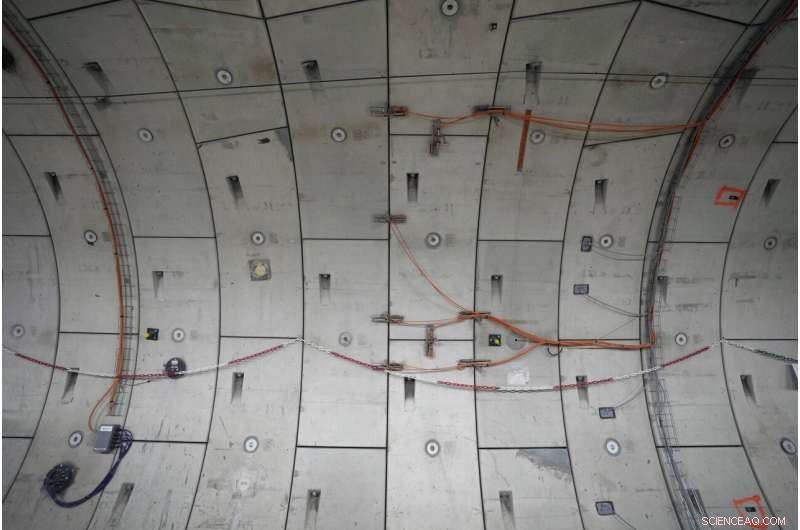
Measuring equipment and seismic detectors are placed in a tunnel for radioactive waste in an underground laboratory run by French radioactive waste management agency Andra, in Bure, eastern France, Thursday, Oct. 28, 2021. Nuclear power is a central sticking point as negotiators plot out the world's future energy strategy at the climate talks in Glasgow, Scotland. Credit:AP Photo/Francois Mori
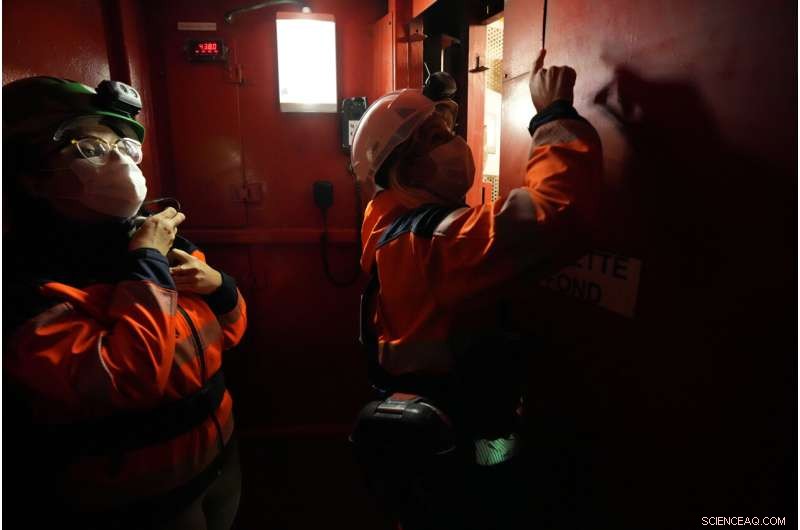
Emilie Grandidier, spokesperson for French radioactive waste management agency Andra, left, and Audrey Guillemenet, geologist and spokesperson, stand in the elevator in Bure, eastern France, Thursday, Oct. 28, 2021. Nuclear power is a central sticking point as negotiators plot out the world's future energy strategy at the climate talks in Glasgow, Scotland. Credit:AP Photo/Francois Mori
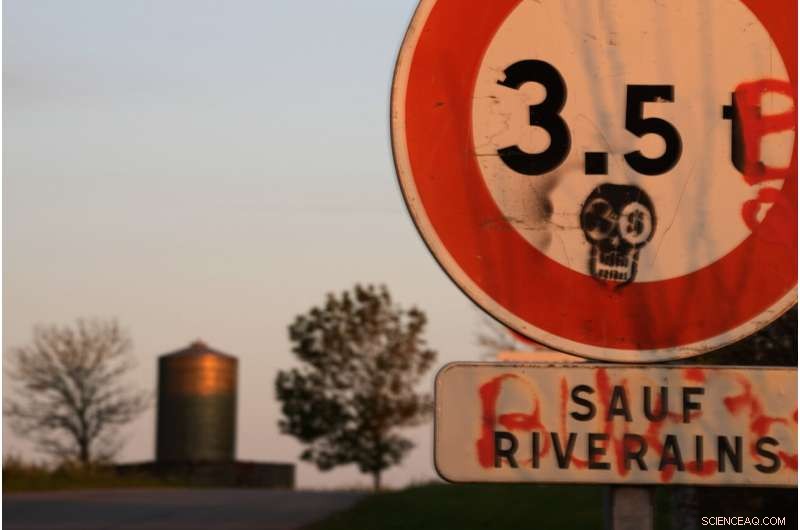
A road sign is painted with a mask with nuclear logos next to an underground laboratory run by French radioactive waste management agency Andra, in Bure, eastern France, Thursday, Oct. 28, 2021. Nuclear power is a central sticking point as negotiators plot out the world's future energy strategy at the climate talks in Glasgow, Scotland. France is laying the groundwork for a permanent, deep-earth repository beneath corn and wheat fields outside the nearby stone-house hamlet of Bure. Credit:AP Photo/Francois Mori
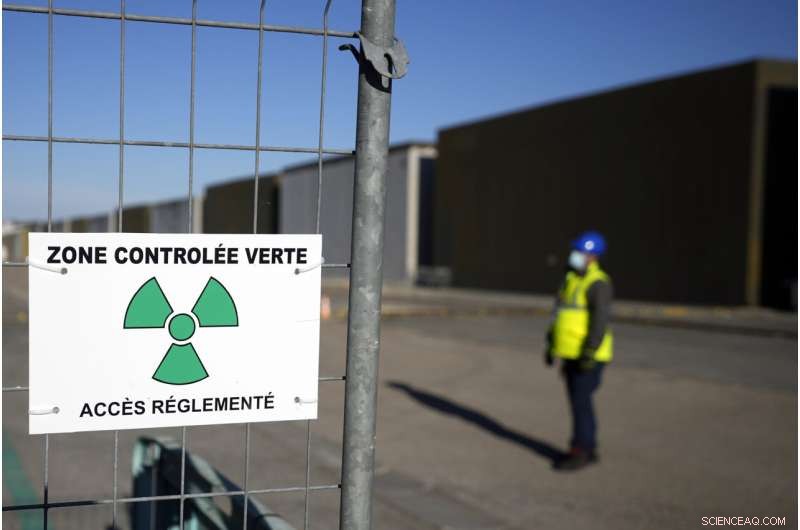
A technician stands next to a radioactive waste storage zone along a concrete-sealed warehouse in the Aube region of eastern France in Soulaines-Dhuys, Friday, Oct. 29, 2021. The site holds low- to mid-level radioactive waste from French nuclear plants as well as research and medical facilities, and its concrete-sealed warehouses are designed to store the waste for at least 300 years. Credit:AP Photo/Francois Mori
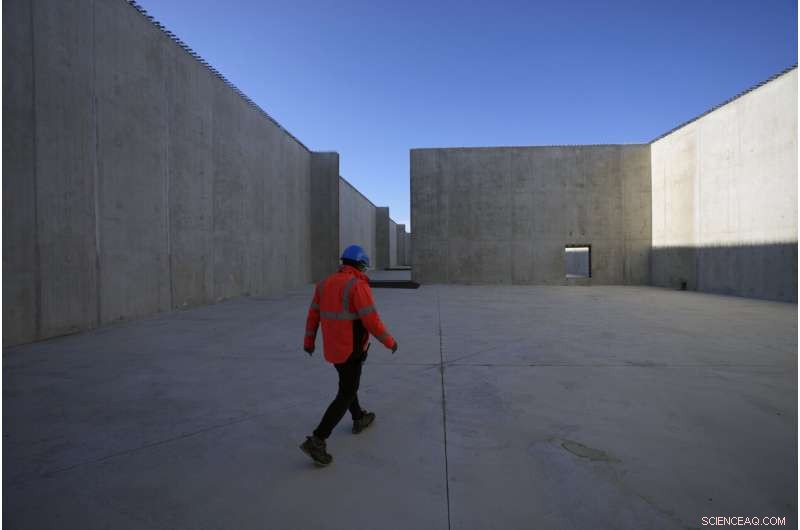
Thierry Pochot, spokesperson for radioactive waste storage sites in the Aube region of eastern France managed by French radioactive waste management agency Andra, walks in a concrete-sealed warehouse in Soulaines-Dhuys, Friday, Oct. 29, 2021. The site holds low- to mid-level radioactive waste from French nuclear plants as well as research and medical facilities, and its concrete-sealed warehouses are designed to store the waste for at least 300 years. Credit:AP Photo/Francois Mori
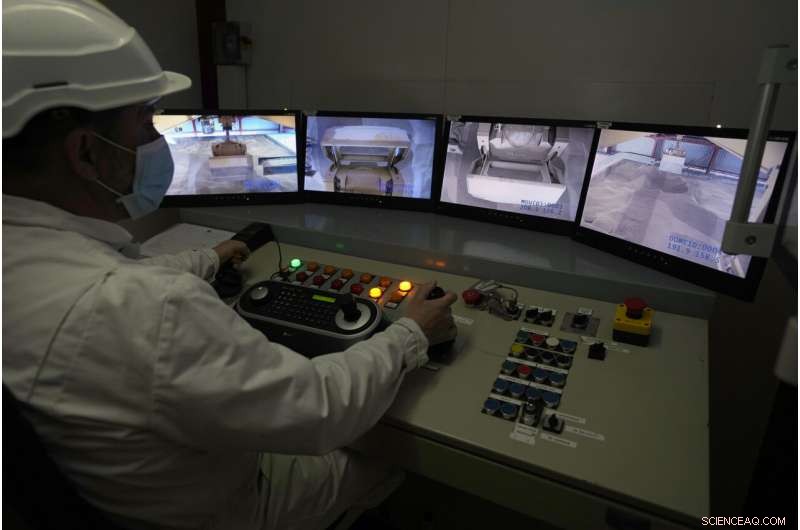
A technician pilots robots for radioactive waste storage in a concrete-sealed warehouse in the Aube region of eastern France in Soulaines-Dhuys, Friday, Oct. 29, 2021. The site holds low- to mid-level radioactive waste from French nuclear plants as well as research and medical facilities, and its concrete-sealed warehouses are designed to store the waste for at least 300 years. Credit:AP Photo/Francois Mori
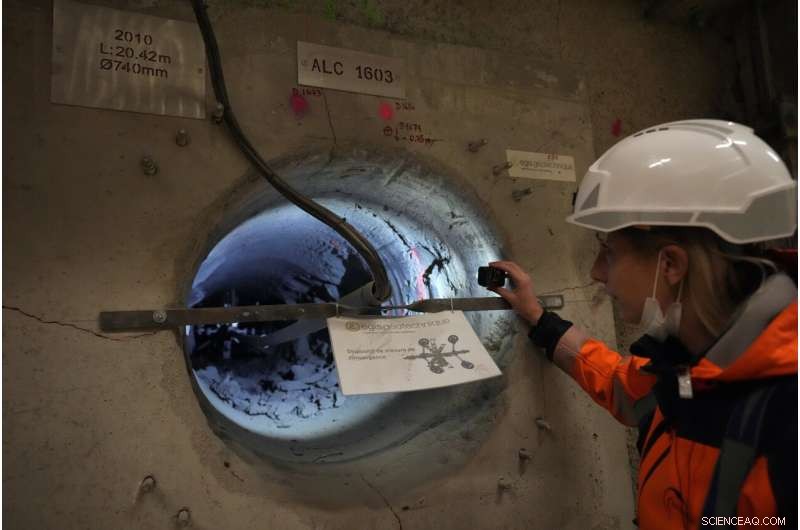
Audrey Guillemenet, geologist and spokesperson, shows a tunnel for radioactive waste in an underground laboratory run by French radioactive waste management agency Andra, in Bure, eastern France, Thursday, Oct. 28, 2021. Nuclear power is a central sticking point as negotiators plot out the world's future energy strategy at the climate talks in Glasgow, Scotland. Credit:AP Photo/Francois Mori
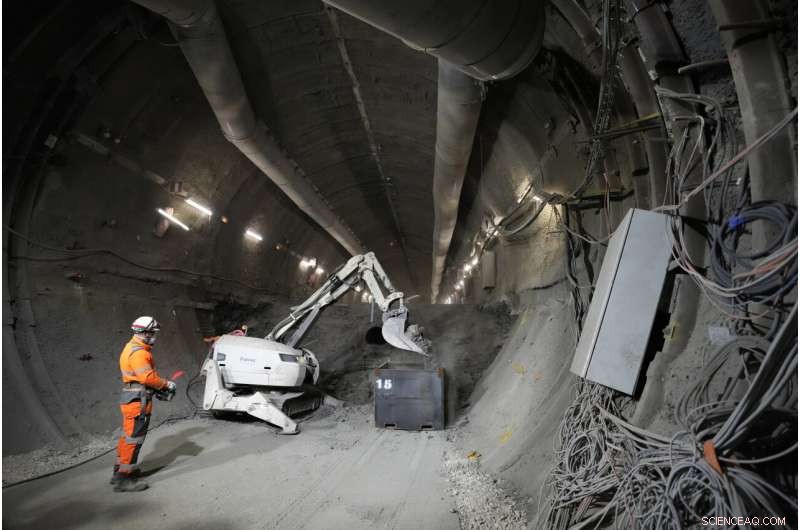
Technicians work in a tunnel for radioactive waste in an underground laboratory run by French radioactive waste management agency Andra, in Bure, eastern France, Thursday, Oct. 28, 2021. Nuclear power is a central sticking point as negotiators plot out the world's future energy strategy at the climate talks in Glasgow, Scotland. Credit:AP Photo/Francois Mori
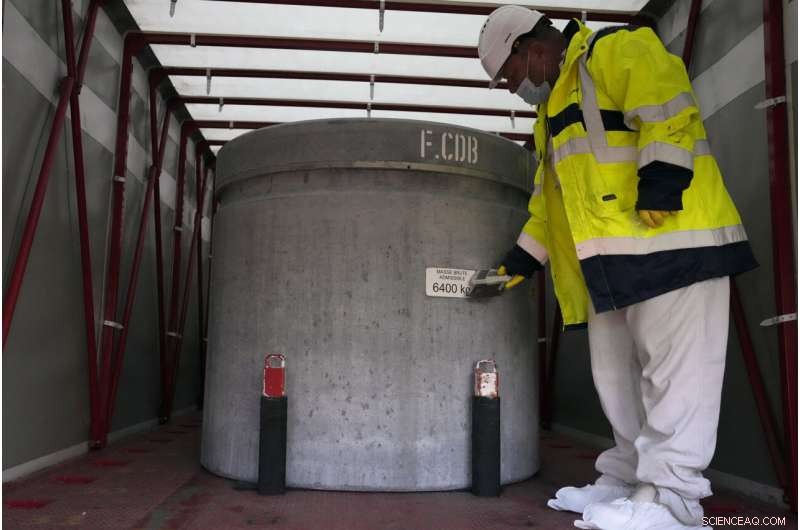
A technician works inside a truck with radioactive waste in the Aube region of eastern France, in Soulaines-Dhuys, Friday, Oct. 29, 2021. Deep in a French forest of oaks, birches and pines, a steady stream of trucks carries a silent reminder of nuclear energy's often invisible cost:canisters of radioactive waste, heading into storage for the next 300 years. Credit:AP Photo/Francois Mori
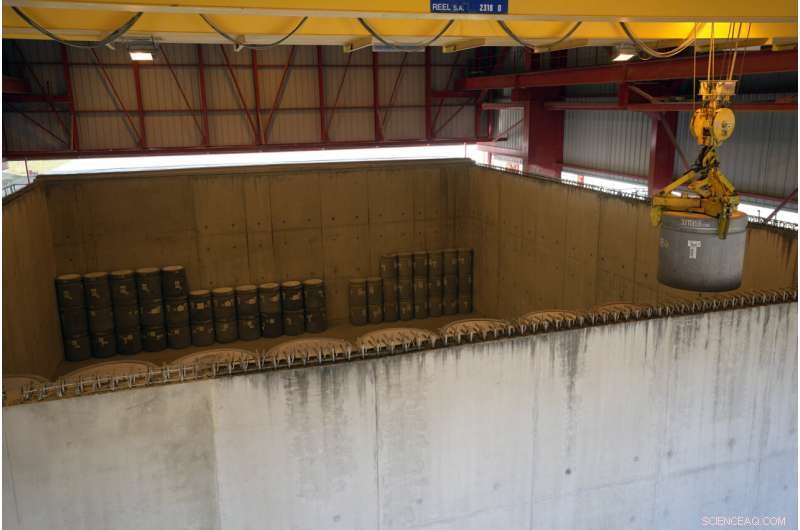
A radioactive waste storage is lifted in a concrete-sealed warehouse in the Aube region of eastern France managed by French radioactive waste management agency Andra, in Soulaines-Dhuys, Friday, Oct. 29, 2021. The site holds low- to mid-level radioactive waste from French nuclear plants as well as research and medical facilities, and its concrete-sealed warehouses are designed to store the waste for at least 300 years. Credit:AP Photo/Francois Mori
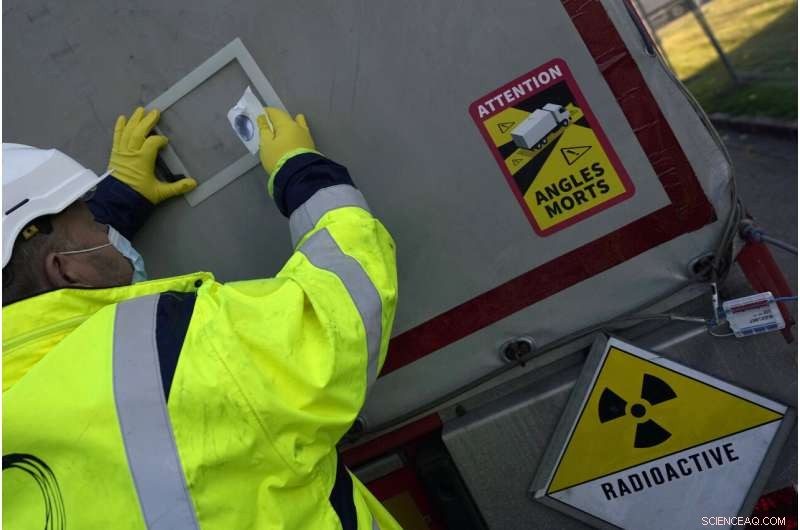
A technician controls a truck with radioactive waste in the Aube region of eastern France managed by French radioactive waste management agency Andra, in Soulaines-Dhuys, Friday, Oct. 29, 2021. Deep in a French forest of oaks, birches and pines, a steady stream of trucks carries a silent reminder of nuclear energy's often invisible cost:canisters of radioactive waste, heading into storage for the next 300 years. Credit:AP Photo/Francois Mori
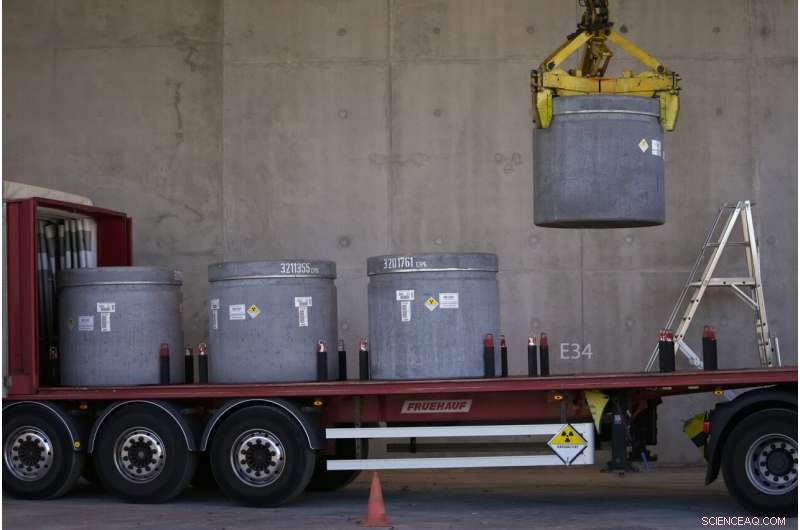
Radioactive waste storage is lifted from a truck in a concrete-sealed warehouse in the Aube region of eastern France managed by French radioactive waste management agency Andra, in Soulaines-Dhuys, Friday, Oct. 29, 2021. Deep in a French forest of oaks, birches and pines, a steady stream of trucks carries a silent reminder of nuclear energy's often invisible cost:canisters of radioactive waste, heading into storage for the next 300 years. Credit:AP Photo/Francois Mori
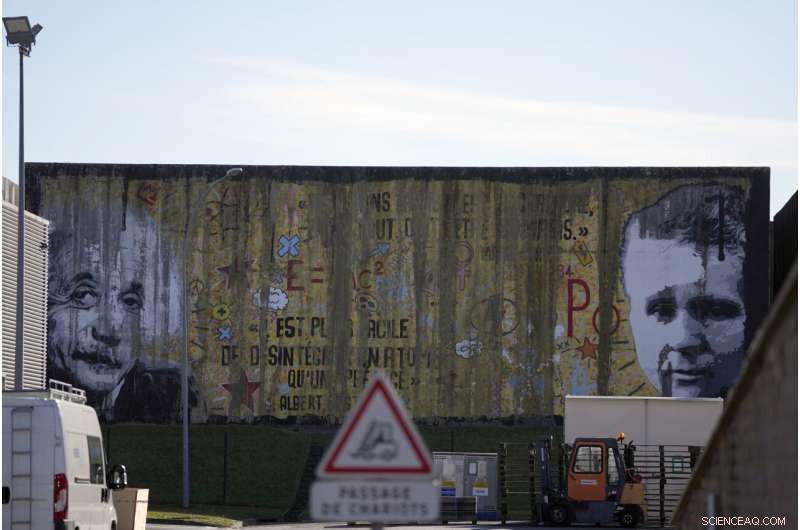
Portraits of scientists Albert Einstein and Marie Curie decorate a concrete-sealed warehouse for radioactive waste storage in Soulaines-Dhuys, eastern France, Friday, Oct. 29, 2021. The site holds low- to mid-level radioactive waste from French nuclear plants as well as research and medical facilities, and its concrete-sealed warehouses are designed to store the waste for at least 300 years. Credit:AP Photo/Francois Mori
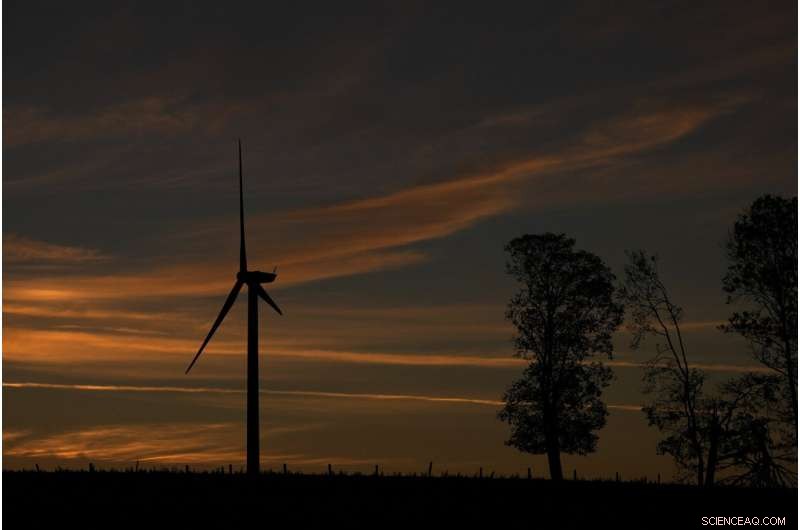
An electricity windmills stands next to an underground laboratory run by French radioactive waste management agency Andra, in Bure, eastern France, Thursday, Oct. 28, 2021. The laboratory, at around 500 meters below the surface, is designed to prepare for a proposed long-term deep-earth nuclear waste repository. Credit:AP Photo/Francois Mori
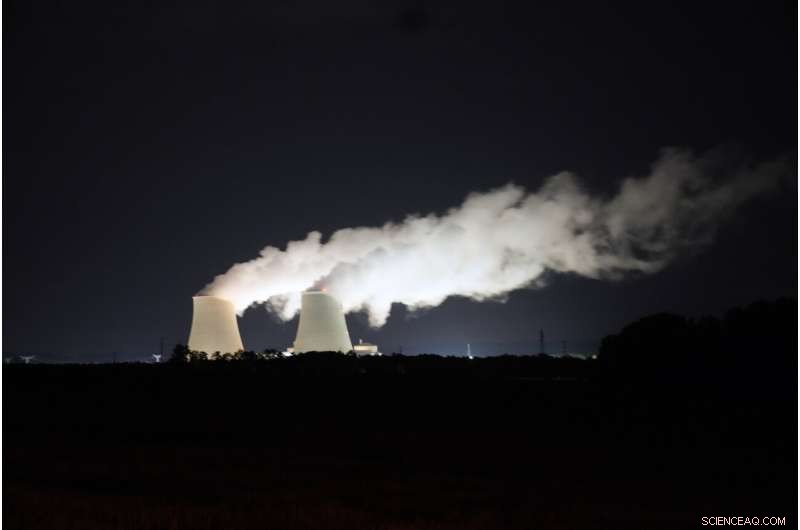
Steam escapes at night from the nuclear plant of Nogent-sur-Seine, 110 kms (63 miles) south east of Paris, Sunday, Aug. 8, 2021. Nuclear power is a central sticking point as negotiators plot out the world's future energy strategy at the Glasgow climate talks. Critics decry its mammoth price tag, the accident risk and deadly waste. But a growing pro-nuclear camp argues that it's safer on average than nearly any other energy source. Credit:AP Photo/Francois Mori, File
The waste, meanwhile, isn't going away.
To make radioactive garbage dumps less worrying to local residents, Andra organizes school visits; one site even hosts an escape game. Waste storage researchers are readying for all kinds of potential future threats—revolution, extreme weather, even the next Ice Age, Guillemenet said.
Whatever happens in Glasgow, "whether we decide to go on with the nuclear energy or not," she said, "we will need to find a solution for the management of that nuclear waste" that humankind has already produced.